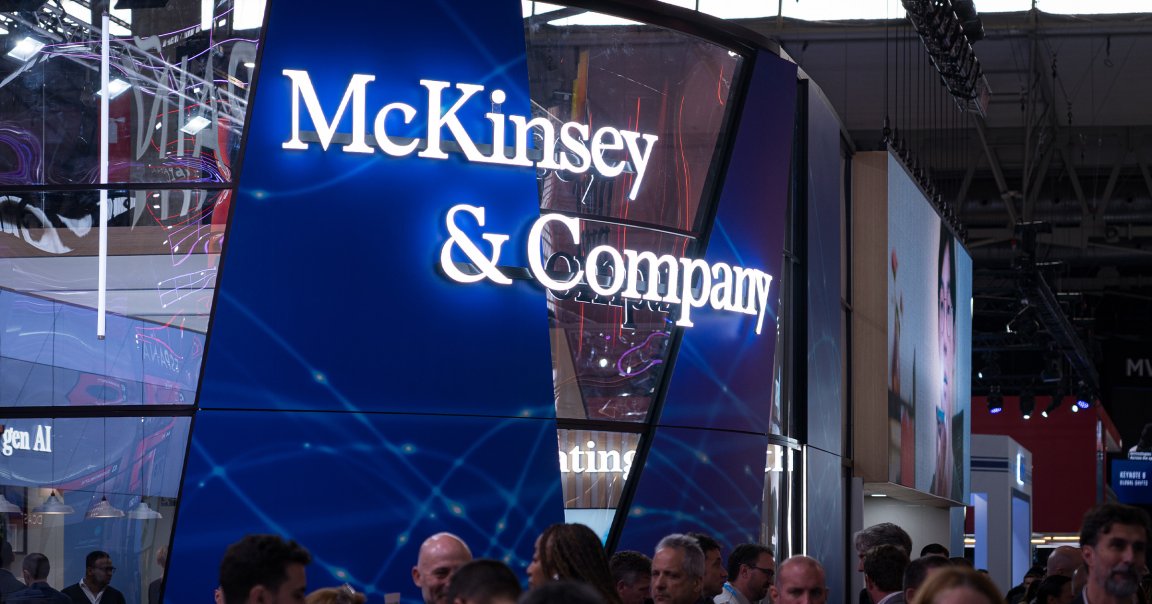
Illustrious consulting firm McKinsey is staring down the barrel of AI.
All those highly-paid suits are at risk as AI agents, AI models designed to autonomously carry out certain tasks, promise to do what they do with instant results — and without six-figure salary demands.
“Do I think that this is existential for our profession? Yes, I do,” Kate Smaje, a senior partner tapped to lead McKinsey’s AI efforts, told the Wall Street Journal. But, she insisted, “I think it’s an existential good for us.”
So the firm is doing what it does best during these transformative times: consulting, now among themselves. AI, according to the firm’s global managing partner Bob Sternfels, is the topic of conversation at every board meeting.
After some deliberation, the firm appears to have decided to mindlessly hop on the bandwagon like everyone else. Per the WSJ, it’s deployed some 12,000 AI agents across the company, which comes off the back of a historic headcount reduction over the past 18 months, with its workforce shrinking from 45,000 to 40,000 employees. The firm emphasizes, however, that it isn’t showing its human grunts the door because of AI.
“We’re going to continue to hire, but we’re also going to continue to build agents,” Sternfels told the WSJ. He envisions that in the near future, McKinsey will have an AI agent for every human it employs.
McKinsey, of course, is no victim but merely trying to double dip in a trend that it’s already cashing in on. According to the WSJ, a staggering 40 percent of the firm’s revenue — last reported to be over $16 billion in 2023 — comes from advising on AI. By going all in, Sternfels framed it as trying to keep up with its clients.
“You don’t want somebody who is helping you to not be experimenting just as fast as you are,” he told the WSJ.
The most widely used AI agent at the firm helps write documents in the firm’s house style. Other AI tools help summarize documents and interviews, and throw together PowerPoints. One even purportedly “checks the logic of a consultant’s arguments, verifying the flow of reasoning makes sense,” according to the WSJ.
But that kind of falling head over heels for AI warrants some skepticism and cause for concern. There’s no denying that AI tools are speedy problem solvers — but they aren’t reliable. Even the most advanced LLMs routinely “hallucinate,” or make up facts that are easily missed. To see how this can go wrong in another professional, suit and tie setting, look no further than growing reports of lawyers committing catastrophic legal blunders by trusting AI tools to write documents or cite case law, which turns out to be complete bogus.
Some research suggests that tech won’t keep enjoying linear improvements, either. The lackluster launch of OpenAI’s much-hyped GPT-5 model last week — after two years in the making — should give pause to anyone expecting vast leaps in AI’s capabilities.
In making such a naked and desperate move to stay relevant by adopting such dubious tech, McKinsey is ironically reinforcing the idea that big, glitzy consulting firms are dinosaurs in this day and age.
In any case, others in the industry see it as a wake-up call to lean more into the human side of things.
“The age of arrogance of the management consultant is over now,” Nick Studer, CEO of the consulting firm Oliver Wyman, told the WSJ. Clients “don’t want a suit with PowerPoint,” he added. “They want someone who is willing to get in the trenches and help them align their team and cocreate with their team.”
“You can get to a pretty good, average answer using the technology now. So the kind of basic layer of mediocre expertise goes away,” echoed Smaje. “But the distinctive expertise becomes even more valuable.”
Sternfels, similarly, touted McKinsey’s reputation as a “leadership factory.”
“That is something I don’t think will be disrupted by AI,” he said.
More on AI: OpenAI Has a Major Problem on Its Hands With GPT-5